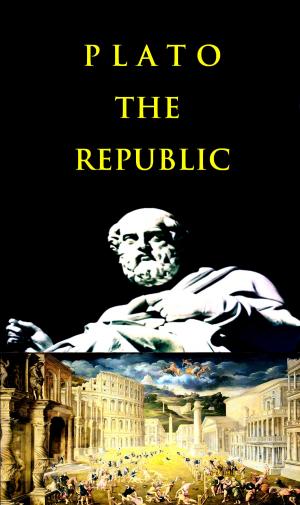Karl Marx The Communist Manifesto & Capital
Nonfiction, Social & Cultural Studies, Political Science| Author: | Karl Marx, Friedrich Engels | ISBN: | 1230001460001 |
| Publisher: | Editions Artisan Devereaux LLC | Publication: | December 8, 2016 |
| Imprint: | Language: | English |
| Author: | Karl Marx, Friedrich Engels |
| ISBN: | 1230001460001 |
| Publisher: | Editions Artisan Devereaux LLC |
| Publication: | December 8, 2016 |
| Imprint: | |
| Language: | English |
The Communist Manifesto is one of the most significant political essays ever devised.
Karl Marx and Friedrich Engels envisioned a society without classes, private property or a state, arguing that the exploitation of industrial workers would eventually lead to a revolution in which Capitalism is overthrown.
The revolution called for:
Abolition of private property—property that could be used to “subjugate the labor of others.”
Elimination of the “bourgeois” nuclear family, replacing home education by social.
End of marriage or monogamy and the creation of a “community of women” not tied to any one man.
Erasure of countries and borders so one nation can no longer exploit another.
Removal of all religious, philosophical, and ideological ideas that conflict with Communism.
Centralization of the means of communication, production, transport, and finance under state control.
This singular global vision provided the theoretical basis of political systems in Russia, China, Cuba and Eastern Europe, affecting the lives of countless millions of people.
Capital [Das Kapital] is a groundbreaking work of economic analysis, one of the most significant essays ever devised by the 19th-century economist and philosopher Karl Marx.
He felt that because all profit results from the “exploitation of labor,” the rate of profit—the amount per unit of total capital outlay—depends largely on the number of workers employed.
Even today, more than one billion Chinese citizens live under a regime that proclaims fealty to Marxist ideology.
This singular global vision provided the economic basis of political systems in Russia, China, Cuba and Eastern Europe, affecting the lives of countless millions of people.
KARL MARX (1818–1883) was a German philosopher, economist, sociologist, journalist, and revolutionary socialist. Marx's theories about society, economics and politics—collectively understood as Marxism—held that states are run in the interests of the ruling class but are nonetheless represented as being in favor of the common interest of all, and that human societies develop through conflicts between ruling classes (the bourgeoisie) that control the means of production and working classes (the proletariat) that work on these means by selling their labor for wages.
FRIEDRICH ENGELS (1820–1895) was a German social scientist, and journalist. He founded Marxist theory together with Karl Marx. He co-authored The Communist Manifesto with Karl Marx, and later helped Marx financially to research and write Das Kapital.
The Communist Manifesto is one of the most significant political essays ever devised.
Karl Marx and Friedrich Engels envisioned a society without classes, private property or a state, arguing that the exploitation of industrial workers would eventually lead to a revolution in which Capitalism is overthrown.
The revolution called for:
Abolition of private property—property that could be used to “subjugate the labor of others.”
Elimination of the “bourgeois” nuclear family, replacing home education by social.
End of marriage or monogamy and the creation of a “community of women” not tied to any one man.
Erasure of countries and borders so one nation can no longer exploit another.
Removal of all religious, philosophical, and ideological ideas that conflict with Communism.
Centralization of the means of communication, production, transport, and finance under state control.
This singular global vision provided the theoretical basis of political systems in Russia, China, Cuba and Eastern Europe, affecting the lives of countless millions of people.
Capital [Das Kapital] is a groundbreaking work of economic analysis, one of the most significant essays ever devised by the 19th-century economist and philosopher Karl Marx.
He felt that because all profit results from the “exploitation of labor,” the rate of profit—the amount per unit of total capital outlay—depends largely on the number of workers employed.
Even today, more than one billion Chinese citizens live under a regime that proclaims fealty to Marxist ideology.
This singular global vision provided the economic basis of political systems in Russia, China, Cuba and Eastern Europe, affecting the lives of countless millions of people.
KARL MARX (1818–1883) was a German philosopher, economist, sociologist, journalist, and revolutionary socialist. Marx's theories about society, economics and politics—collectively understood as Marxism—held that states are run in the interests of the ruling class but are nonetheless represented as being in favor of the common interest of all, and that human societies develop through conflicts between ruling classes (the bourgeoisie) that control the means of production and working classes (the proletariat) that work on these means by selling their labor for wages.
FRIEDRICH ENGELS (1820–1895) was a German social scientist, and journalist. He founded Marxist theory together with Karl Marx. He co-authored The Communist Manifesto with Karl Marx, and later helped Marx financially to research and write Das Kapital.








![Cover of the book Noa Noa [French language Edition] by Karl Marx, Friedrich Engels](https://www.kuoky.com/images/2015/november/300x300/1230000757218-SvyP_300x.jpg)






